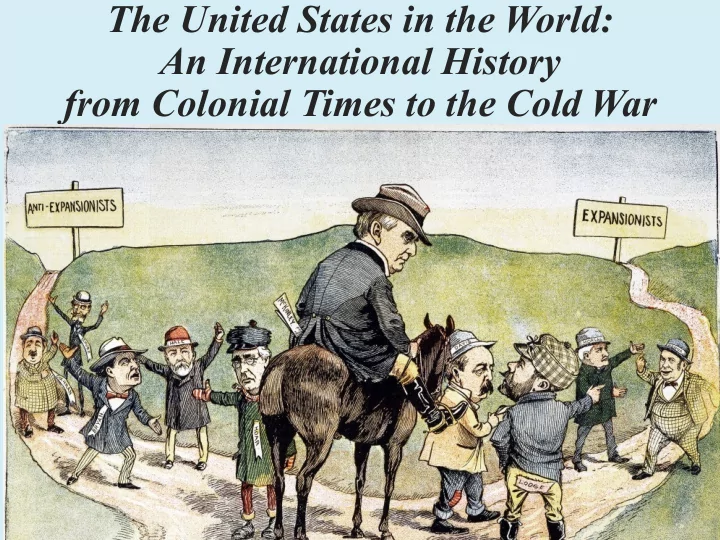

The United States in the World: An International History from Colonial Times to the Cold War
Rough Course Schedule v Week 1: Colonial Possessions in a World at War v Week 2: New Republic, Perilous World, 1787-44 v Week 3: Manifest Destiny, 1844-1898 v Week 4: Emerging Great Power, 1898-1914 v Week 5: United States in the Great War, 1914-18 v Week 6: Interwar Interregnum, 1919-1941 v Week 7: United States in World War II, 1941-45 v Week 8: From World War to Cold War, 1945-
Polk: Partisan War President v Excessive partisanship only served to create political martyrs v Undermined Gen. Taylor (1848 nominee) and Gen. Scott (1852 nominee) v Broke with Benton over Fremont (1856 GOP nominee)
Lincoln, Seward & Foreign Affairs v William H. Seward: “One war at a time, William” v Foreign intervention v Britain: Charles Francis Adams v France: William Dayton v Preservation of the Union vs. ending slavery, 1861-62
Lincoln’s Shrewd Diplomatic Strategy v Essential to keep Britain & France out v Given the border states, he emphasized preservation of the Union v But he risked British or French intervention
Lincoln’s Diplomatic Challenges v Keep Britain & France from aiding or recognizing Confederacy (remember 1778) v Avoid any incident that might give cause to Britain, France v Balance preservation of the Union vs. emancipation
Stormy Anglo-American Relations v Britain issued 1861 neutrality proclamation recognizing Confederate belligerency v France & other Europeans acted with more caution v British official circles: sympathy for Confederacy; it had achieved independence
Charles Francis Adams Minister to Britain v Yet another difficult Adams (low opinion of Lincoln) v Like father, JQA, a shrewd diplomat (grasped British class differences over war) v Instrumental in maintaining British neutrality & preventing recognition
Prime Minster Palmerston v British believed Lincoln sought to preserve the Union, not abolish slavery v Illegal US seizure of Confederate diplomats James Mason & John Slidell from Trent , Nov. 1861 v British demanded release & official apology
Adam’s Measured Diplomacy v Fearful that Anglo- American war would result, Adams counseled restraint to Seward & Lincoln v US released the diplomats; Seward & Adams appeased Britain to avoid war (“One war at a time, William”)
(Red: Where the proclamation would apply Blue: Where it would not apply) A War Measure: Seizure of Property. Recruitment of Black Troops. Reverberations Abroad.
William Dayton at the Court of Emperor Napoleon III v Like Franklin before him, Dayton shrewdly achieved amicable relations v A less genial diplomat might have triggered transatlantic war (& Confederate victory)
Pictured: Emperor Napoleon III v Dayton served shrewdly v This despite his inability to speak French v Exploited French suspicions of the British v Napoleon’s support of Maximilian in Mexico
Dayton’s Challenges in Paris v Confederate attempts to build warships in French shipyards v Cotton shortage (pretext for Anglo-French intervention?) v 1864 death in apartment of a famous courtesan: “a delicate situation”
“Seward’s Folly” 1867: Alaska Purchased for $7.2 million
“Our New Senators” v Purchase provoked resistance v The “Color Line”: one publication complained about the prospect of “Exquimaux fellow citizens.”
One historian quipped that the deal went through because, in the end, there weren’t that many ‘Exquimaux,’ & there was quite a lot of Alaska!
Cleveland’s Counterintuitive Foreign Policy v Opposed territorial expansion v Withdrew treaty to construct canal through Nicaragua v Reversal on Hawaii v Venezuela Dispute
Recommend
More recommend